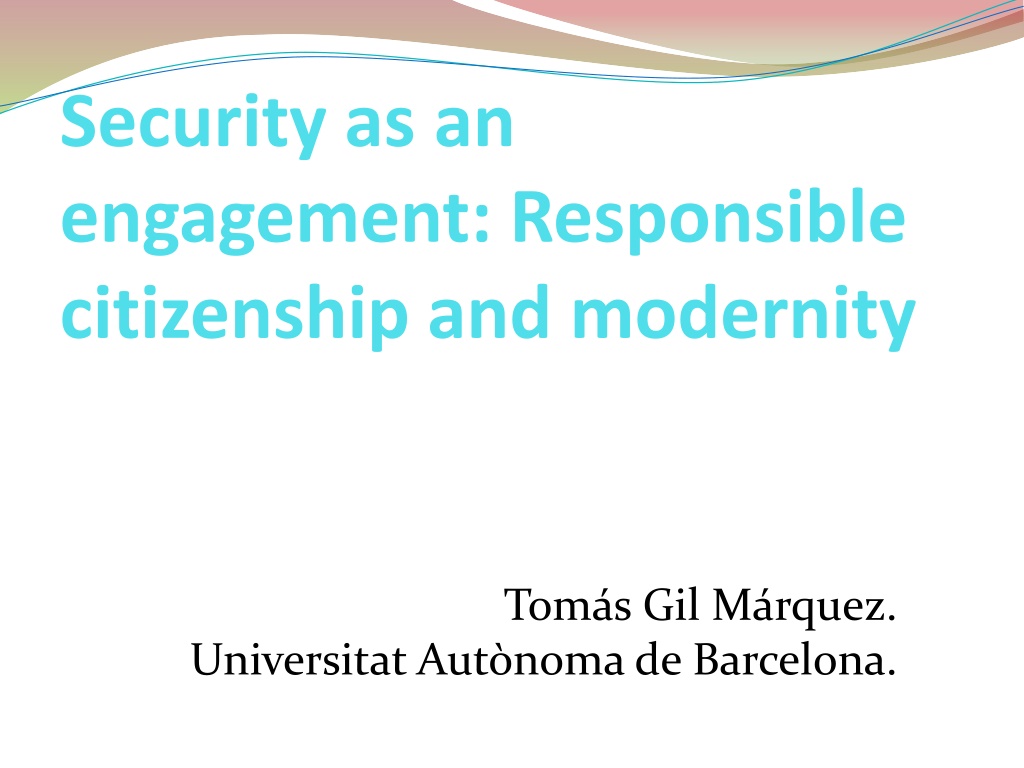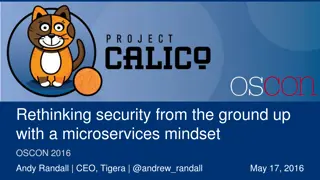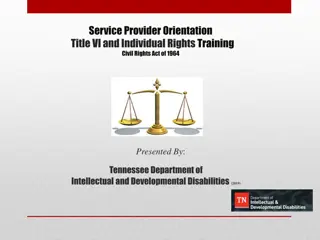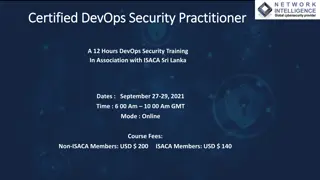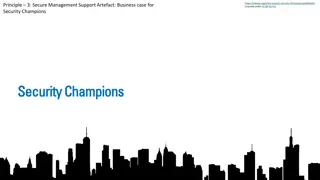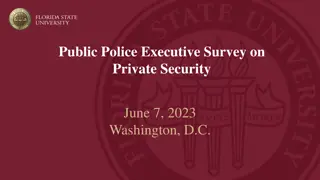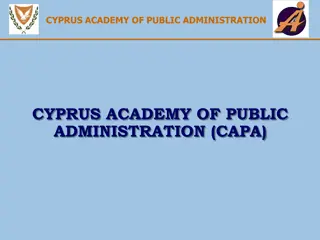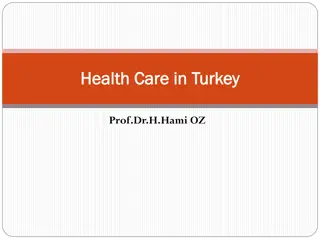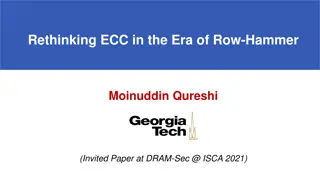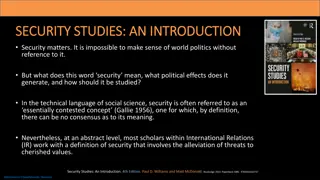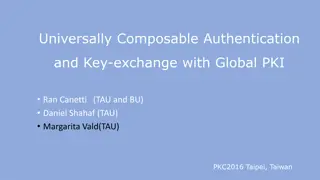Rethinking Public Security: Civil Society's Role and Modern Challenges
Including civil society as a key player in public security, this article discusses historical security concepts, the role of the police in fighting crime, and the need for a new security apparatus grounded in reflection and objective analysis. It emphasizes the importance of addressing critical issues beyond traditional statistics and calls for a system that goes beyond endogamous character and false corporatism. The text also highlights the significance of understanding crime causes and the need for internal analysis within the public security framework.
Download Presentation

Please find below an Image/Link to download the presentation.
The content on the website is provided AS IS for your information and personal use only. It may not be sold, licensed, or shared on other websites without obtaining consent from the author. Download presentation by click this link. If you encounter any issues during the download, it is possible that the publisher has removed the file from their server.
E N D
Presentation Transcript
Security as an engagement: Responsible citizenship and modernity Tom s Gil M rquez. Universitat Aut noma de Barcelona.
I believe to be correct to include civil society as an actor/player in the field of security. Civil society has become an international actor whose actions could be complementary or alternative to governmental action.( Admiral Jose Maria Ter n elices, chairman of the Joint Defence Staff of the armed forces - EMACON-)
also a formidable challenge. Considering to reflect on security is not only risky but In ancient times happily overcome, the notion of security was used as a bait to trap the most conservative sectors in. Those sectors even monopolised the concept of security and appropriated one of its most representative ( prima facie) instruments: The police.
Public security system must be based on making the police an effective tool to fight against criminality. It shouldn t be only a simply generator of cold statistics that shows us committed crimes, clarified crimes, types of crimes, the day, the hours and the places of those crimes but also it should be able to address critical issues such as the degree of victim satisfaction with the security system, the criminological profiles of the offenders ( repeat offenders or occasional offenders ), the socio- economic strata etc. The police fights against crime ( The European Code of Police Ethic)
should overcome traditional schemes and roles. It should allow us to articulate a security apparatus based on the study and grounded on reflection and an objective analysis of what is happening in our society. Moreover, this new system should be devoid of endogamous character and still away from false corporatism. The philosophy of this very new system of public security Security it is not only up to policemen.
causes of crime Tony Blair: Against the crime Against the very that leaves internal analysis to other operators such as universities, schools of criminology or research centres. We shouldn't have a system founded on external analysis
Security is an essential part of public policies subject to an intense debate, but not from the perspective of the past when the police apparatus was conceived as the reference of the formula action-reaction. Studies on safety and security and the proposals carried out on that basis should also revolve around the participation of citizens as actors within the system. .
Studies and analysis on public security should reach think-thanks and allow social partners to participate as society is increasingly changing and plural. on promoting civil participation as well as bringing in professionals in the fields of sociology, law and other social sciences. The philosophy of security system should be focused of concern for police. Crime and criminality must be approached through a multidisciplinary system capable enough to respond to the phenomenon of criminality. Crime and criminals must not be solely an element
on the philosophy of joint responsibility. It must be equipped with mechanisms capable of explaining to society, what is being done, how it is being done and how much does it costs the taxpayer. Explaining, in short, how the money for security issues is spent. It also feels necessary to design a security system based become engaged even further. We should consolidate a security system in which citizens
It must be a system based on openness with regard to leadership and community relations. That system shouldn't be a police chiefs generator stricto sensu but a security directors generator. Some of those directors performing police duties could come from the Police while some others not. They should, during their studies, be trained in Police Schools as well as in institutes for higher learning for public managers. managers of public services having a deep sense of commitment to the community. Police authorities, now more than ever, must be truly
dynamic. It is not a managed society anymore but a society involved in decision-making that exerts a healthy monitoring over public powers. Today's society is becoming increasingly complex and resolution mechanisms hitherto used should be replaced by others which allow us to meet the new needs of our time: Immigration, organized crime, youth problems, domestic violence etc.. Under the current circumstances traditional conflict
Citizens' participation gives individuals the opportunity to establish direct relations with security decision-makers within a particular territory. Citizens' participation is a crucial instrument of social control in a democratic society. Citizen's participation is the channel through which one can visualize transparency and accountability.
respond to upcoming challenges. Public security policies must design more transversal organizations, coordinated by a common objective and distanced from rational and bureaucratic criteria that undermine the adaptive capacities to new circumstances. Police organizations need flexibility and dynamism to
The assessment of results must be guided by professional standards and by a high degree of objectivity. statistics. Nevertheless, statistics on their own will be useless unless the procedure followed is correct Traditionally, this activity has been redirected towards We should not merely provide figures but provide also data allowing us to draw reliable conclusions and to modify strategies. Methodology is a key issue when talking about outcomes.
-Today, we learn of the upgrading and modernisation of public administration as well as objective-based plaining and available resources, unknown concepts hitherto. Such terms were firstly used in the private sector, and we assist now to its transposition to the public sector. -I consider that the use of such concepts in the field of public security must be framed in our constitutional model of public security. -Public security falls within the form of the state designed in article 1 of Spanish constitution: a social and democratic state governed by the rule of law. .
the denial of the values that private sector has brought and keeps bringing to our security system. This question is no longer a matter of discussion. I just simply try to delineate clearly the responsibilities of the private and the public sector although such a delimitation is clearly stated in article 104 of Spanish constitution. All this thoughts shouldn't be interpreted in any way as
Police duties and functions must be imbued with strategic thinking. This will let us design and elaborate projects for action on the basis of collected, analysed and verified information. Thus, we will be able to advance and interpret future scenarios which could become reality and cease being a mere hypothesis.
-If we cannot design possible scenarios and their correlative action guides we will have fossilised organizations. affirms that: The adaptation of organizations is what determines the long-term value of private corporations ( MOORE 1998:87). I believe this principle to be perfectly transferable to public security I agree in this matter with Mark.H.Moore when he
Strategic thinking and quality among police organizations are good tools in accordance with Mark.H.Moore words: Public executives should strive to define purposes of value for the collectivity and be able to produce them. In adittion to their own continuity, they must be ready to tailor and to reposition their own organizations in the political and operational environment (MOORE 1998:91) The managers responsible for police organizations, in Moore words, should rebrand/reinvent their organizations in order to flee from routine, adapt to new requests and to fulfil with quality the legitimate expectations of citizens.
-Several months after being invited as an expert by a parliamentary committee of the regional parliement of Catalonia, that was created ad hoc to discuss about the advisability of the carriage of Taser-Weapons by the autonomic Catalan police force, I am still unable to find an explanation to what happened: -Modernity should not be neither an obstacle nor a impeding way of interpretation to the improvement of police work conditions. This improvement is increasingly necessary. -The ideology of some make them loose sight of reality. They persist in the do-godism and in a permanent sense of distrust and suspicion of the police: This is the ideology of the anti- establishment movement at least in Catalonia. Yes I am speaking here about a concrete political party( The CUP)
I remain at your disposal for any questions or clarification. Many thanks for your attention. Tom s Gil M rquez Tomas.gil@uab.cat
